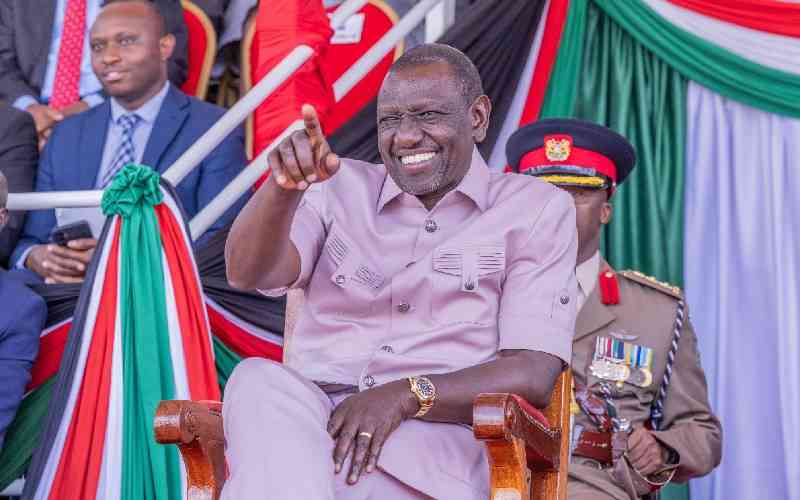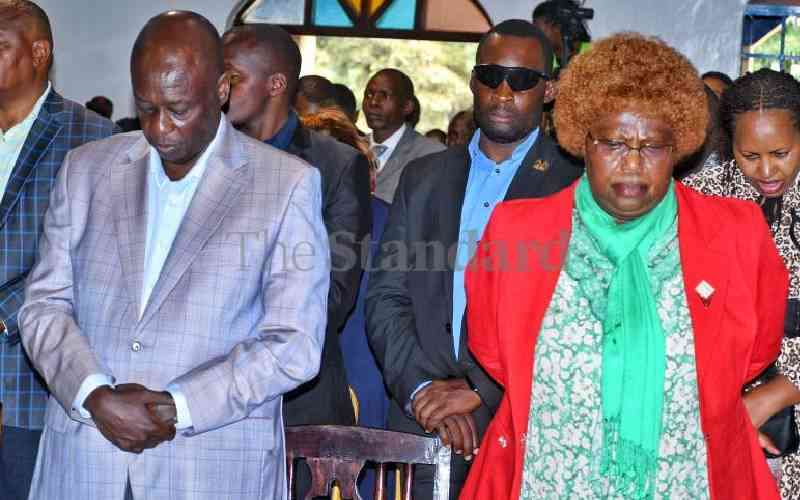The massacre of 28 Kenyans in Mandera County last Saturday, brought tears of shame and bitterness to me. Shame of being a Kenyan. In the 1980s, I had the privilege of working in Garissa County as a correspondent for the Nation Media Group and a reporter with the Kenya News Agency (KNA). My tour of duty took me across Wajir, Mandera, Dadaab, Kismayu and deep into Somali and Ethiopian territory.
In those days, filing a story was a dramatic affair. I would “beg” either the military or the Administration Police officers to allow me use their radio transmitters to talk to copy takers in Nairobi. I would also make reverse calls from the only two telephone booths in Garissa.
At times I would travel for two or three days, depending on the weather to Dadaab, Mbalambala, Hulugho or Kismayo in search of stories. Each journey was a security and health risk. Shifta bandits were lurking in every bush and so were wild animals and communicable diseases.
The shifta were a guerrilla militia supported and sponsored by the government of Siad Bare of Somalia. They were agitating for secession of north eastern Kenya. My experiences in the northern frontier are subject of a movie or bestseller. I hope to share them with the world in my forthcoming autobiography; Every Day is Christmas.
I remember a time when our driver attempted to run over a huge python that had crossed into our path against advice from our local guide. The front tyres had barely touched the reptile when it hissed, recoiled and flung the object of our car across the road. We were rescued by a military truck. I had to later research on the massive muscular power of a full grown python.
Eventually, a story that I wrote about a bandit attack on the residence of then Provincial Commissioner Amos Bore led to my arrest, incarceration and eventual sacking from KNA.
The narrative then was that of a region forgotten by successive governments. It was the dark corner of doom and gloom. A place where errant civil servants were transferred to as punishment. An enclave ruled by terror and brutality from the shifta bandits.
If you wanted a story of medieval Kenya, you had to travel to north-eastern and northern Kenya. All Garissa-bound buses would stop at Ukasi in Mwingi County for refuelling and security escort. They would all travel in convoy under police escort necessitated by repeated shifta attacks.
I am ashamed that nearly 30 years after I left north eastern, nothing has changed. The Government continues to mishandle security issues in this region. To win the war on insecurity in north eastern and northern Kenya, the government must urgently address historical and economic injustices and sins committed against residents of these regions.
The residents are still profiled as Kenyan Somalis, or Muslims; they suffer humiliation while seeking passports or national identification cards; hospitals are none existent; water remains elusive; sewerage and sanitation are a mirage; insecurity is a constant nightmare. The same fate applies to their neglected cousins in Turkana, Pokot and Samburu.
Most Kenyans may not know but counties like Marsabit and Mandera enjoy services such as health, water and security from neighbouring Ethiopia and Somalia. I recently attended a World Bank/Governors forum where the Marsabit, Wajir, Mandera and Garissa governors told tearful tales of suffering of their people who have never known peace and have never known what it feels like to be Kenyan.
One Governor pleaded: “We pray to God every day that He may give us oil so that at last Kenyans can accept us, respect us, recognise us and acknowledge us as part of this country.”
Another one said; “Our people are so backward educationally and professionally yet the county cannot afford to pay for other Kenyans to work in our county. And when we can pay, we are not able to assure them of their security. Hardship and fear drives them away after only a few months’ sojourn.”
When a pregnant woman goes into labour in Marsabit, she is at times transported on the back of lorries and trucks to Meru County over 300 kilometres away. Many never make it.
Somalia might be at war but residents of Mandera sell their livestock in markets in Somalia because they offer not just better prices but a channel to markets in the Middle East. While the government of Ethiopia has constructed roads into its territory from the Kenyan border, we are yet to construct a kilometre of tarmac in Wajir.
Stay informed. Subscribe to our newsletter
The residents of the northern Kenya are still children of a lesser god. ?Worse fate befalls other Kenyans who ?relocate there to seek employment.
They are massacred relentlessly. They are butchered with relish. They are killed almost as a sport. Some locals might be tempted to treat them with contempt; a form of xenophobia informed by the perception of a privileged lot from Kenya coming to lord it over the local underdog. Once you live in that part that desires to be called Kenya, you will understand the occasional anger and mistrust of the locals.
Whenever bandits strike, the reaction of our security apparatus is less than a whisper. The military display during the Westgate attack can never visit these regions and whenever the military calls, it leaves behind tales of bitterness and torture.
I once interviewed Simeon Chacha, a former DC on how the provincial administration dealt with insecurity in Wajir, Garissa and Mandera. He said at times he would regret the suffering the Government subjected the locals to. It had failed to understand the culture, customs and way of life of the north eastern residents: “Since we were desperate for information, we hurriedly classified every Somali into a stereotype. They all looked, sounded and acted the same. To get information from them, some unorthodox methods were employed,” Chacha would later tell me while he was Nyanza PC. He later passed on.
The chilling Mandera story made me miss former President Daniel arap Moi. Mzee Moi offered Kenya a leadership that came with firmness and assurance on matters of security. Moi would not have kept jokers and pretenders in the security docket.
Mwai Kibaki took over from Moi at a time when his own hands-off style of leadership, the hiccups of sharing power with a restless opposition and new-found freedom by Kenyans introduced chaos and confusion into the country. Since then; criminals, terrorists, organised gangs, conmen and madmen rule our lives.
Al Shabaab militants are simply taking advantage of the confusion fuelled by greed that has sipped in our national psyche and anatomy. Greed has become our most cherished national value thus lighting up fires of corruption in all spheres.
Al Shabaab know those regions are technically ‘not’ part of Kenya. The people living and working in these areas have never felt Kenyan. The terrorists can play and toy with our security forces; slaughter and main with relish and abandon.
President Uhuru Kenyatta must deliberately hasten the development and economic growth of these regions. He needs to rapidly erase tears and memories of brutality from the hearts and minds of these regions. He needs to offer equal opportunities in security provision to all Kenyans. He needs to shake up, toss, turn and eject the entire rusty security entrail. As a matter of urgency and patriotism, after Joseph ole Lenku and David Kimaiyo, he should go for all clowns in security and military attire.
 The Standard Group Plc is a
multi-media organization with investments in media platforms spanning newspaper
print operations, television, radio broadcasting, digital and online services. The
Standard Group is recognized as a leading multi-media house in Kenya with a key
influence in matters of national and international interest.
The Standard Group Plc is a
multi-media organization with investments in media platforms spanning newspaper
print operations, television, radio broadcasting, digital and online services. The
Standard Group is recognized as a leading multi-media house in Kenya with a key
influence in matters of national and international interest.
 The Standard Group Plc is a
multi-media organization with investments in media platforms spanning newspaper
print operations, television, radio broadcasting, digital and online services. The
Standard Group is recognized as a leading multi-media house in Kenya with a key
influence in matters of national and international interest.
The Standard Group Plc is a
multi-media organization with investments in media platforms spanning newspaper
print operations, television, radio broadcasting, digital and online services. The
Standard Group is recognized as a leading multi-media house in Kenya with a key
influence in matters of national and international interest.





